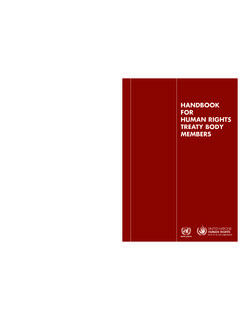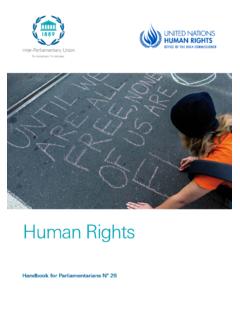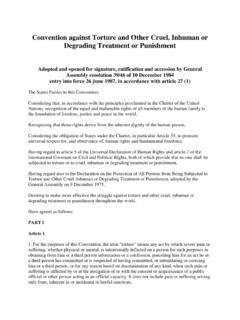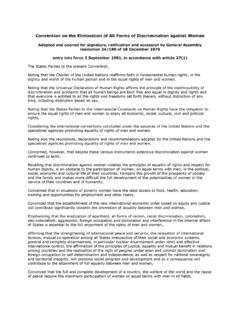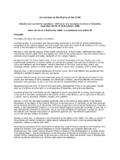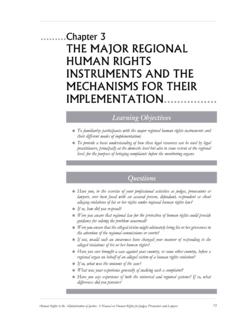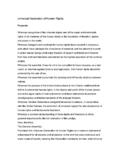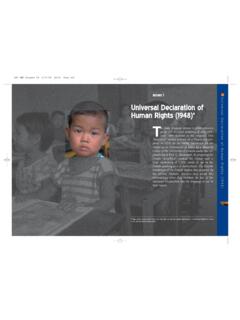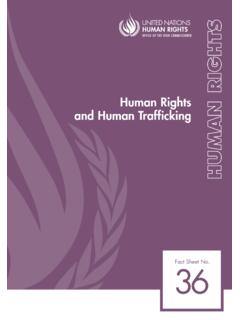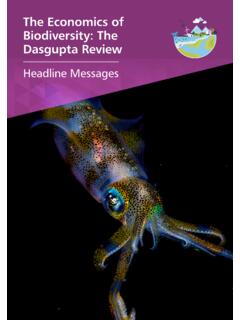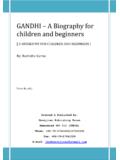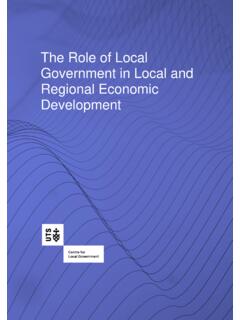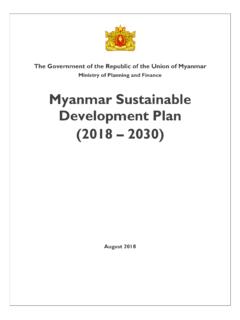Transcription of Empowerment, Inclusion, Equality - OHCHR
1 In the 2030 Agenda for Sustainable Development , governments around the world committed to a blueprint for a more just and sustainable path for people, planet and prosperity , with 17 Sustainable Development Goals (SDGs) that seek to realize the human rights of all .1 As we enter the most pivotal decade for SDG implementation, the theme Empowering People and Ensuring Inclusiveness and Equality of the 2019 High-level Political Forum for sustainable development (HLPF) couldn t be more timely. Amongst the calls for more resources, more political will, more tools, technology and faster implementation, it is a reminder that equitable and sustainable development must be achieved with and not for people. Achieving the transformational promise of the SDGs depends on ensuring the empowerment, inclusion and Equality of all people, which is so closely interconnected with human rights.
2 1 The promotion and protection of human rights is about empowering people to stand up for themselves and for each other, for Equality , and for inclusive societies. This is how the power of human rights can foster and accelerate a transformative development agenda. When we think of struggles for empowerment, inclusion and Equality we think of heroes who have fought for their rights: luminary individuals like Mahatma Gandhi, Rosa Parks, Malala Yousufzai or Marielle Franco. They stood up for the rights of marginalized peoples, for the rights of the excluded voices who suffered in silence and whose dignity was not respected. Out of these movements the message for justice and human rights continues to spread across the world: Yes, every human being matters, everyone is born equal in dignity and rights.
3 Human rights matter because they embody the power of people standing up to change the world. Above all this is what the 2030 Agenda needs to accelerate its course. Empowerment, Inclusion, Equality : Accelerating sustainable development with human rights With the most pivotal decade of SDG implementation ahead of us, the 2019 HLPF theme of Empowerment, Inclusion and Equality is a reminder that the transformational promise of the 2030 Agenda can only be achieved with the respect, protection and fulfilment of human rights. When people can exercise their human rights, they can stand up for themselves and for each other, they are empowered to shape the decisions that impact their lives. Human rights stand for Equality , for participatory and inclusive societies that dismantle the structures of discrimination which drive poverty and inequality.
4 When everyone can claim their human rights, no one can be left behind. Human rights are not only the right way, but the smart way to accelerate progress for more equitable and sustainable development. Empowerment, Inclusion, Equality : Accelerating sustainable development with human rights The SDGs already mirror much of the human rights framework. Each sustainable development goal, whether aimed at eradicating hunger, preventing disease, providing clean water or climate action, or focused on securing peace or decent work all are simultaneously a claim about human rights. Development is not just about changing the material conditions that prevent a person from reaching these goals. It is also about empowering people with voice and agency to be active participants in designing their own solutions and shaping development policy.
5 It is about transforming laws, policy, practice, social norms and power relations such that everyone can flourish in equal dignity and freedom. This is recognized in the 2030 Agenda commitment to create a world of universal respect for Equality and non-discrimination , by ensuring targets [are] met for all nationals and peoples and for all segments of society and that the SDGs realize human rights for all . At its heart, the Agenda 2030 promise of leaving no one behind is a reaffirmation that human rights and sustainable development are mutually reinforcing. Development is a powerful tool, but it can also be a tool of the powerful unless human rights for all, without discrimination, is part of its design. With limited time and resources, it is crucial to focus on securing rights for all, as not only the right way, but the smart way to achieve more sustainable development.
6 Human rights can help to guide and navigate tough choices, resolve social conflict, prevent backsliding, provide for progressive realization and build resilience in a world that otherwise risks remaining unequal, unstable and unsustainable. At the 2019 High-Level Political Forum, governments will review progress in achieving empowerment, inclusion and Equality for all. They will assess progress in achieving the SDGs that are dedicated to these objectives; goals on ending discrimination and combating inequality (SDG 10), strengthening democratic governance, inclusive participation, global partnerships, rule of law, access to justice and personal security (SDG 16) and creating an enabling international environment (SDG 17). The review will also focus on ways in which the theme relates to goals for more inclusive quality education (SDG 4), decent work for all (SDG 8) and equitable climate action (SDG 13).
7 While significant progress has been made, there remain many gaps. As we approach the next crucial decade of SDG implementation, governments are under pressure to accelerate their efforts significantly. development can be a powerful tool, but it can also be a tool of the powerful unless fundamental rights are part of its design With limited time and resources, it is crucial to focus on securing rights for all, as not only the right way, but the smart way to achieve more sustainable development. A people-centered, inclusive and equitable approach requires its own investment of time, political will and resources. The returns however will be far reaching for unlocking the transformative potential of all other social, economic and environmental commitments in the 2030 Agenda.
8 As governments make pledges toward acceleration, they can consider how human rights can guide SDG implementation to achieve deeper, more transformative results. This pamphlet describes how the principles of human rights set the standards for what it means to truly empower people and address the discrimination at the root of inequality and exclusion. Empowerment, Inclusion, Equality : Accelerating sustainable development with human rights People are empowered when they can claim their human rights Empowering people means moving beyond purely technocratic solutions and treating people as passive objects of aid or charity. People are empowered when they are able to claim their rights and to shape the decisions, policies, rules and conditions that affect their lives.
9 An approach to development that is grounded in human rights treats everyone as agents of their own development. This is why the right to development requires free, active and meaningful participation in development . This principle of working with and not just for the people is reflected across all the SDGs in different ways. It is reflected in the SDG targets to empower people, especially women and girls, as a means to SDG achievement. It is reflected in targets that support people s ability to claim and exercise their rights and to allow for checks on power: such as the fundamental freedoms to dissent, express opinions without fear; access information; have a legal identity; organize; participate in economic, social and political decisions and access justice. It is also reflected in the targets on universal access to education, health, water, food and equal opportunities.
10 Empowerment requires securing civil and political rights as well as economic, social and cultural rights. People living in poverty, who face obstacles ranging from hunger and illiteracy, to lack of transportation to communication barriers, may face barriers in fully exercising their power. Women living in poverty are often the furthest removed from public life, access to information and participation by their burden of domestic responsibilities, restrictions on mobility and access to economic resources, as well as by discriminatory norms. Empowerment means recognizing and addressing these obstacles, investing in all people to build the knowledge and skills that enables them to act as agents of their own development. From a global perspective, people living in developing countries can also be left behind , due to geography, conflict or climate crises, so it is also critical to create fair terms and conditions for all countries and equal participation in global governance.
